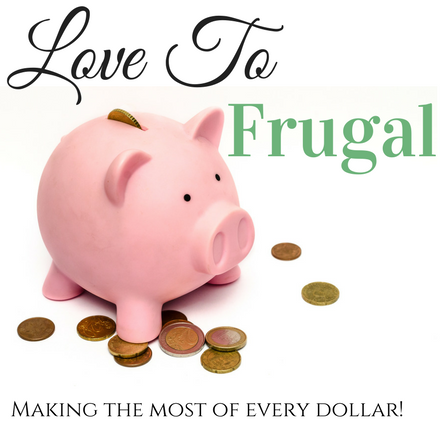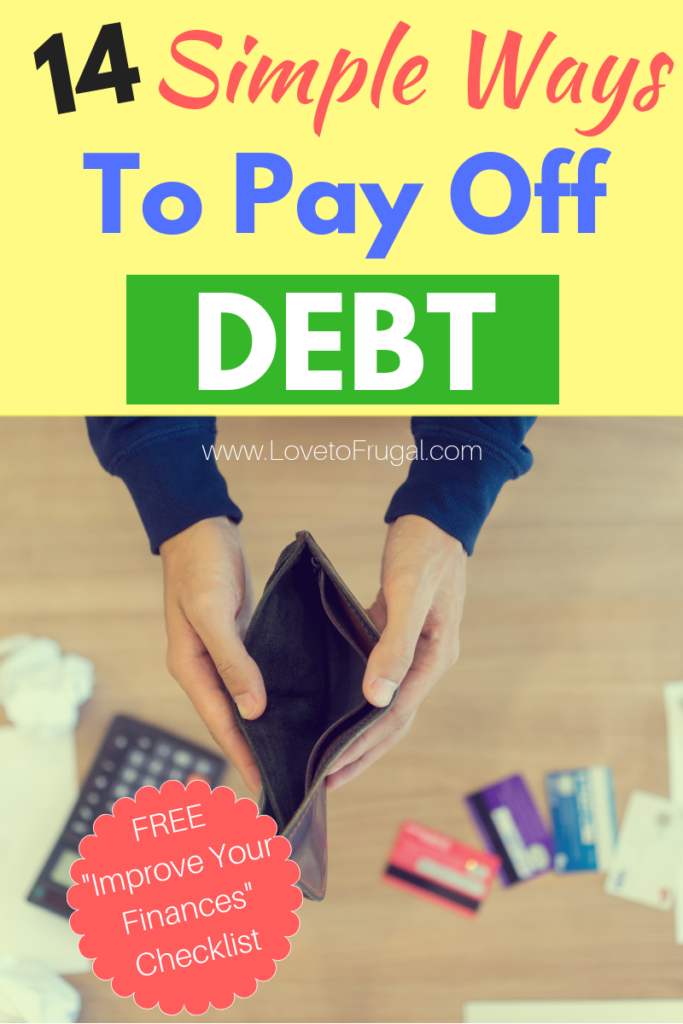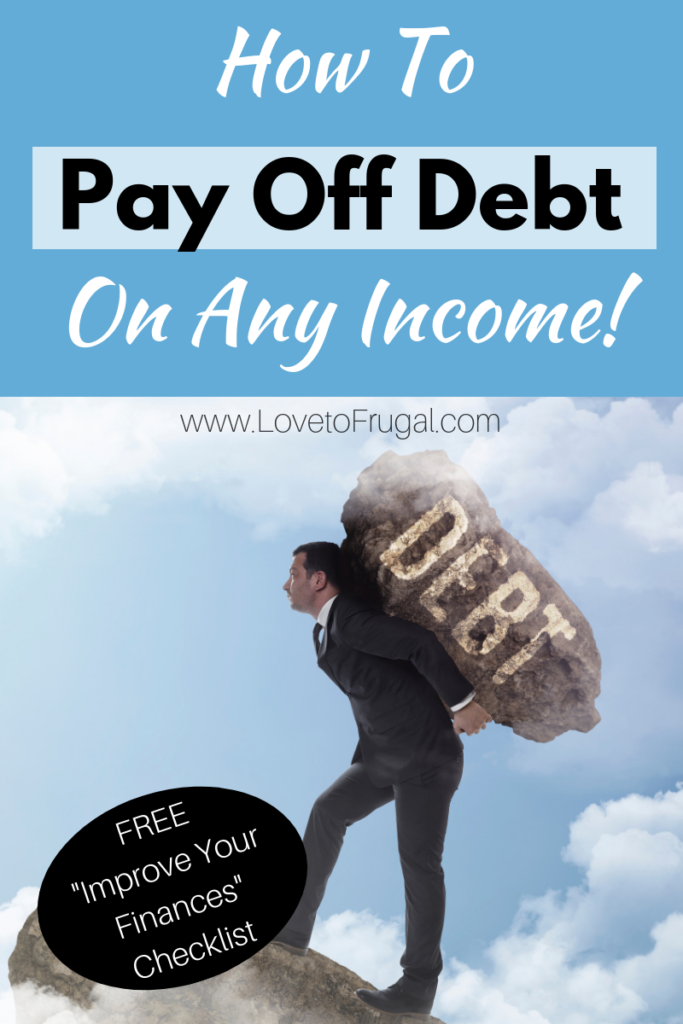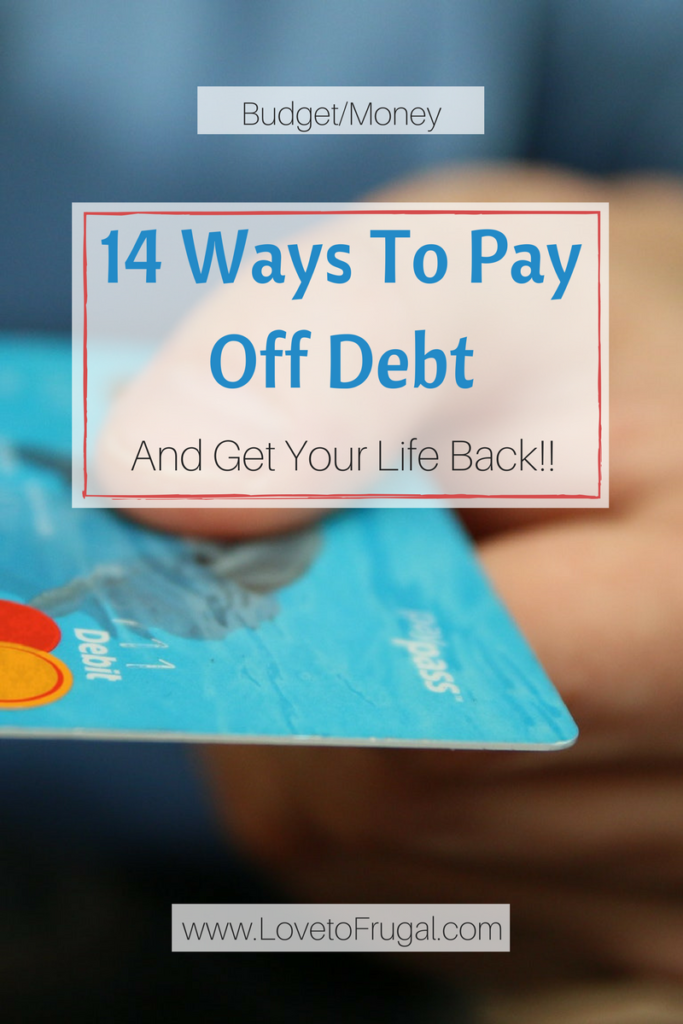14 Ways To Pay Off Debt and Get Your Life Back
How many times have you looked at your finances and felt so overwhelmed that you didn’t have a clue where to start? Just know, you’re not alone. Personal Finance can be a scary subject. But what’s even more scary is you’ll never get out of debt by ignoring it. It’s easy to wander into debt, but you have to be intentional to get out of it. I’m going to try to give you some ideas to get you thinking of ways to pay off debt so you can hopefully, get your life back!
When you are free from debt, you can and will make different decisions about everything from career choices to where you want to live. Yes, being debt free gives you freedom…freedom to choose! Sure, you’ll have to make some sacrifices and choices that may not always be the most comfortable, but keep the end game in mind. It’s NOT a permanent situation.
Think of debt like a real life emergency. The longer you wait to tackle it, the worse it gets! Your house is on fire and you may need to take drastic measures to put the fire out!
And the thing is, you don’t have to have a huge income to start the debt reduction. If anything, it’s more important to get out of debt if you don’t!
*This post may contain affiliate links. For more information, see my disclosure page.
14 Ways to Pay Off Debt:
So here are some ways to pay off debt that have worked for me and my family and I hope they’ll work for you too.
Track Your Spending
This is the first step and a crucial one, in getting out of debt. If you don’t know where your money is going, you can’t tell it what to do. If you can’t account for some or all of it, you’re not letting your money work for you.
Track your spending for at least one month. To get a really good idea of how youre spending it, track it for 2-3 months. You’ll be amazed at how much waste you’ll be able to find…maybe even astonished!
I remember when I sat down one day, with a friend of my daughter. He was working in the oilfield and was making really good money, yet he always seemed to be broke! By broke, I mean down to literally pennies in his checking account.
We wrote down his income and subtracted all of his expenses from it and low and behold, there was $1,500 (for the month) that he couldn’t account for! He had nickel and dimed his checking account down to nothing for things like going out to eat, entertainment and basically nothing of importance. He was totally shocked! So as you can see, this one is very important.
Do a Budget!
Once you know where your money is going, it’s time to put it to work for you. I think budgets get a bad rap. I’ve been told that budgets are restrictive. I have to disagree! A budget is you telling your money what to do instead of wondering where it went. A budget gives you “permission” to spend. If you have money allocated for dining out, entertainment, clothing, etc., you shouldn’t feel guilty about spending for those things. It’s when you’re broke and you spend on those things anyway, that will get you into trouble. Without a budget, you become more broke. If you need help starting a budget, try reading 8 Simple Steps for Setting Up a Budget to help get you started.
Stop Spending
This is critical if you truly want to get out of debt. Cut spending down to bare bones. Make sure you take care of what Dave Ramsey calls the “four walls”. You need to buy food, keep your utilities current, make sure your rent/mortgage is current and make sure not to get behind on your car/insurance. You also need to be able to put gas in your car. If those four things are paid up to date, you live to fight another day.
Once you’ve started tracking your expenses, you may find that you are spending an astronomical amount of food, whether it’s groceries or eating out. I found this to be the case when I began tracking my grocery spending. I was shocked! Groceries are one of our largest expenses and probably the easiest to control and cut back on. Once you do this, I can almost guarantee that your going to find extra money. You’ll feel like you’ve gotten a raise. Become more conscience of what your buying, meal plan and never go to the grocery store without a list.
With that said, write out ALL of your expenses and what you spend money on day to day and in addition to food, see where you can cut. Stop going thru the drive thru at Starbucks, cut your satellite/cable, subscriptions, etc. Basically, if it’s not absolutely necessary for you to get by, cut it out.
Save An Emergency Fund
If you know anything about Dave Ramsey’s 7 baby steps, you know that step #1 is to save $1,000 as fast as you can. You may wonder why this is step one, if you’re in debt. Well, it’s very simple. If you have no money in savings and life happens to you, like your car breaks down or your hot water heater goes out in your home, the emergency fund is there to keep you from going deeper into debt. Check out this post, A Simple Guide to Starting An Emergency Fund to get started.
Prioritize Debt With the Debt Snowball Method
Simply put, the debt snowball is a strategy used to reduce debt by paying off debts in order from smallest to largest balance, regardless of interest rates. When the smallest debt is paid in full, you take the money that you were paying on that debt and roll it into the debt with the next smallest balance. Make sure you are paying at least minimum payments on the other debts. This snowball keeps rolling until the last debt is paid. Here’s my post, How To Get Out of Debt With the Debt Snowball.
Use the Cash Envelope System
What is the cash envelope system? Well, I remember my mom doing this when I was a kid. She had money “stashed” away in envelopes for everything from groceries to gas. More recently, Dave Ramsey has made this system a household word, again.
The way it works is that you use cash instead of credit or even debit, for categories in your budget. It keeps you from overspending and allows you see how much you have left in any given category.
Some of your biggest budget busters are groceries, restaurants and entertainment. Of course there are others, but these tend to be the top three.
You budget so much for each category for the month, divide that number by how many paydays you have each month and go to your bank and with draw that amount out. When the money is gone, it’s gone! Simple!
This really does work. I’ve even written a blog post about it. I’ve been doing it for a while, but I was stubborn and hard headed for the longest time. I thought I could control the amount if I had the number in my head and I would either just write a check or use my debit, instead of putting the cash in the envelopes. But, let me tell you. There’s just something about spending the cash that makes you a little more careful.
If your budget isn’t working or you keep overspending in these categories every month, try the cash envelope system. Give it a chance. I promise you, it will work. You may also need to adjust the amounts in the categories, as well. (Make sure not to cheat on your envelopes, either. If you do that, it’s not a budget any longer.)
Increase Your Income
If you just can’t make ends meet, you’ll need to increase your income. Here are just a few ways, off the top of my head.
- Put anything and everything you don’t need or use any more on Craigslist.
- Have a garage sale!
- Take a part time job
- Start looking for higher paying jobs
- Deliver pizzas
- If you’re crafty, open an Etsy shop. I’ve had one for years at Love2PaintDesigns
There are a million ways to do this. Remember, it doesn’t have to be permanent. Do what you have to do to get the ball rolling toward getting out of debt.
Downsize
You may think that this is drastic, but have you considered that you may be house poor? A good example of this is if you have a house payment that is over 50% of your take home pay, you’re house poor. There is no way to sustain that amount and prosper. Ideally, your house payment should be no more than 25-30% of your take home pay. Don’t forget to add in taxes, insurance, maintenance, etc. in figuring what your home is costing you. In this scenario, it probably would be wise to consider something more affordable.
Downsize the Car Payment, too!
Another area that I strongly suggest you look at is your car payments. I know…I know…we Americans seem to have a love affair with our cars, but car payments could literally be costing you your retirement. They DO NOT have to be a way of life. We haven’t had a car payment in almost 10 years. First of all, we drive our cars till the wheels fall off. Seriously…it’s true. When we buy now, we pay cash. We don’t do car payments anymore. No, they’re not brand new, but there are so many good used cars out there. Let someone else eat the depreciation. They’re considered used as soon as you drive them off the lot.
Another good rule of thumb, when it comes to cars, RV’s, boats, etc. is their total value (whether they’re paid for or not) should never be more than 50% of your yearly pay. Period. If it is, you have too much tied up in things that are going down in value. An example would be if you make $60,000 a year and you buy a $30,000 vehicle, plus have a $10,000 car (even its paid for), you have way to much tied up in cars. I know this is tough one, but unfortunately, it true.
Stay Away From Temptation
I’m not going to say too much about this one. I think we all get it. If going to the mall is your favorite pastime and your in debt from it, stay away from the mall.
If your circle of friends go out to eat a lot, take expensive trips that they want you to participate in or are just bad influences, in general, you may need to look elsewhere for a new group of likeminded friends. Haven’t we all succumbed to temptation at one time or another when we were with our buds? I know I have, especially if there’s wine involved! Try not to keep putting yourself in that situation. That’s all I’m saying.
Negotiate Bills
This suggestion is meant for those who may be significantly behind and/or have been turned over to collections. Your credit may have already suffered from this, but if you would like to (and should) pay your debts, you can usually negotiate with creditors for some sort of settlement. Most credit card companies and medical debt will negotiate for pennies on the dollar. I would never suggest being delinquent on purpose. If you owe it, you should pay it, if you can. But, when a debt reaches a certain age, it’s easier to negotiate. The one thing to remember is when you do this, you must have the negotiated amount in your possession, as they usually want their money right away.
Use Found Money For Debt
Found money is any money that you have extra to throw at debt. It can be an income tax refund, a raise at your job, the sale of something big, like property or cars. Make this found money work for you. Get intense and spend it wisely.
Stop Investing, Temporarily
I know some of you will probably disagree with me on this one, especially if you get a company match on your 401K, but stay with me here. You’re trying to get out of debt. You need every bit of extra money you can lay your hands on for this. Only do this if you are serious and intense about getting out of debt and living your dreams. When they are focused, most people can get out of debt in 18 to 24 months. Most of the time, stopping your 401K contributions, for this short amount of time will not hurt you. Once you are out of debt, your free to pick up with the investing AND you’ll be able to do more, with no payments!
Read “The Total Money Makeover”
Not going to elaborate here, other than saying Dave Ramsey has changed our lives. I have been following him and his principles for over 15 years and I have to say, life is good.
Reward Yourself
I put this last, for a reason. It’s hard for we humans to stay this intense and focused if there is no light at the end of the tunnel, for a long time. Depending on how long it may take you, I strongly recommend celebrating your little wins along the way. Plan for them, of course, and certainly don’t go hog wild, but we all need to feel a sense of accomplishment and the rewards that go along with it. It’s like recharging our batteries and it’s certainly ok. What’s not ok is paying off a credit card and then turning around and put your “reward” back on it. Think in terms of cash, cash, cash. If you can’t pay cash, don’t do it…plain and simple.
Benefits of Being Debt Free
Where do I start? First of all, I think we’ve all heard the old saying, “The borrower is slave to lender”. Well, it’s true! As long as you have debt, you’re not in control of your money or your future. Your lenders will! They decide how much you pay them, when you pay them and can change the terms on you at any given moment. When you become debt free, you’re in control of your money, not a bank or a credit card company.
Secondly, being debt free reduces so much stress in our lives. Let’s face it, stress can lead to numerous health issues, both physically and mentally. Debt is also a main contributor to divorce in North America. Getting rid of debt could literally save your marriage AND your life!
Debt is a vicious cycle. Sometimes people go deeper into debt because they can’t afford to buy things, because of the debt. Therefore, they use more debt to buy more stuff until they reach the end of the borrowing rope. Getting debt free breaks this horrible cycle.
I could go on and on, but I think you get the idea. Once you decide your sick and tired of being sick and tired, only then will you make the sometimes drastic changes needed to finally get control of your hard earned money. But let me tell you, it’s totally worth the effort. Like my buddy, Dave, says, “If you’ll live like no one else now, later, you can live like no one else”!
What are some things that you have done to help chip away at debt? I’d love for you to share them in the comments and be sure to subscribe to Love To Frugal so you never miss a post!




Thanks for the tips Kim… Going to try the envelope method!
You can do it, Maria! It works!:)